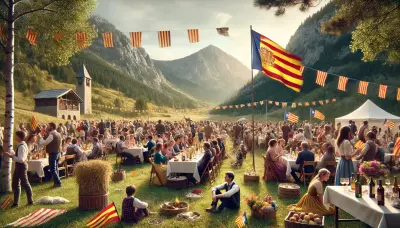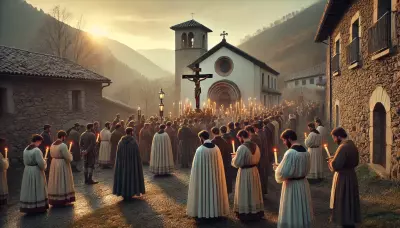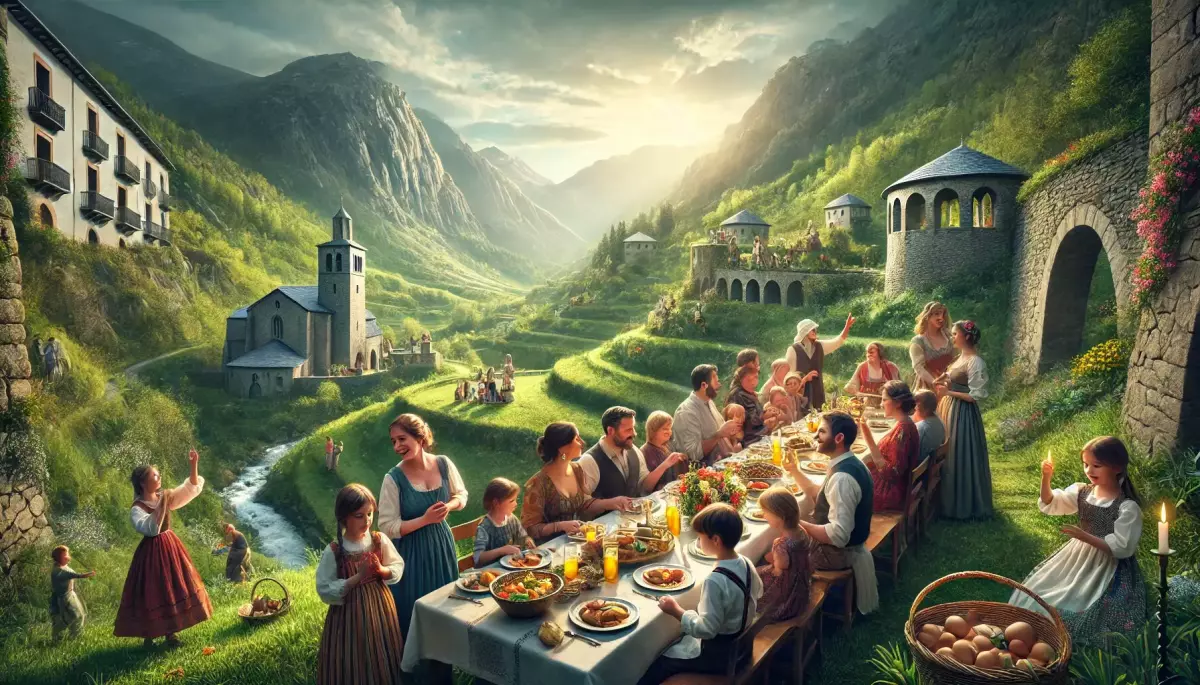The Easter Sunday in Andorra is a celebration rich in traditions that reflect the cultural heritage of the small country. On this special date, communities gather to participate in rituals that combine religious and folkloric elements, promoting a sense of unity and belonging. The festivities include masses, processions, and typical dishes, which attract both locals and tourists, making the experience even more vibrant and meaningful.
Moreover, this celebration is a unique opportunity for the Andorrans to reaffirm their traditions and strengthen community ties. Easter is not only a moment of spiritual reflection but also a moment of cultural renewal, where the past and present meet in a harmony that enriches Andorran identity. Thus, the festivities of Easter Sunday play a crucial role in the preservation and appreciation of local traditions.
History and Meaning of Easter Sunday in Andorra
Easter Sunday is one of the most significant celebrations in the Christian calendar, and in Andorra, this date is marked by a rich tapestry of traditions and cultural significance. Easter celebrates the resurrection of Jesus Christ, symbolizing renewal and hope. In Andorran history, this date is also a moment for spiritual and community reflection. The origin of the celebration dates back to the early centuries of Christianity when Easter began to be celebrated as a fundamental event for the Christian faith.
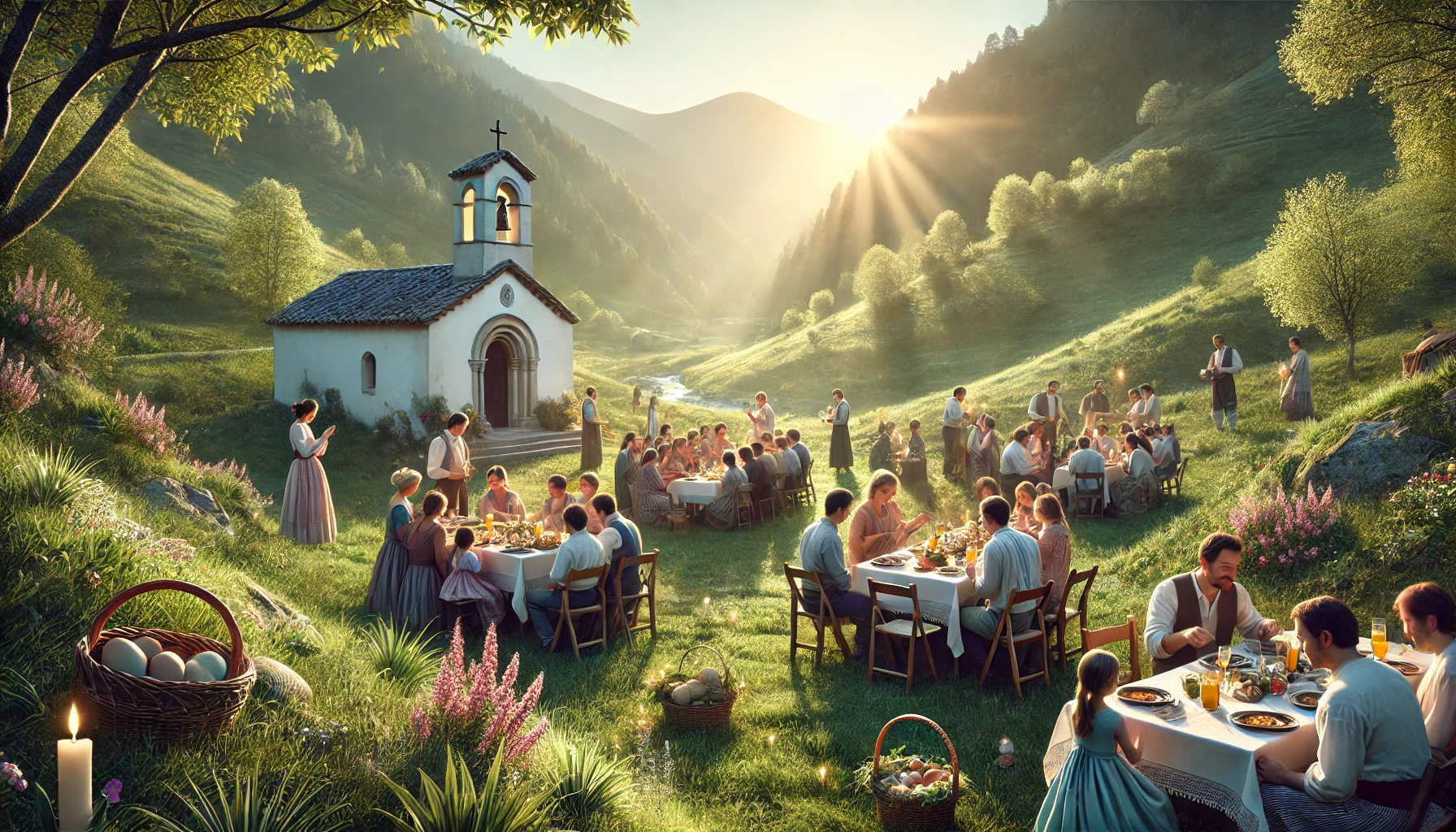
Over the years, Easter Sunday has solidified as an important holiday in Andorra, being officially recognized. During this day, communities gather for various religious activities, such as masses and processions, which highlight the importance of resurrection and new life. The holiday is not just a moment of religious celebration but also a time for family, where culinary and social traditions intertwine, strengthening community bonds.
In addition to its religious significance, Easter Sunday in Andorra reflects the cultural syncretism present in the region. Influences from different traditions, such as Catalan and French, manifest in the celebrations. This not only enriches the Easter experience but also promotes a sense of unique cultural identity, essential for the Andorran people. Thus, this date is an opportunity for the inhabitants of Andorra to celebrate their vibrant cultural heritage while reflecting on the values of faith and community.
👉 Download the Calendar for 2025
Full Calendar of Easter Sunday until 2050
Next Event
New Year's Day - 01/01/2026| Year | Next Date |
|---|---|
| Easter Sunday in 2029 | 03/25/2029 |
| Easter Sunday in 2034 | 03/25/2034 |
| Easter Sunday in 2039 | 03/26/2039 |
| Easter Sunday in 2041 | 03/30/2041 |
| Easter Sunday in 2046 | 03/30/2046 |
| Easter Sunday in 2024 | 03/31/2024 |
| Easter Sunday in 2043 | 04/03/2043 |
| Easter Sunday in 2048 | 04/03/2048 |
| Easter Sunday in 2021 | 04/04/2021 |
| Easter Sunday in 2026 | 04/05/2026 |
| Easter Sunday in 2036 | 04/05/2036 |
| Easter Sunday in 2031 | 04/06/2031 |
| Easter Sunday in 2040 | 04/07/2040 |
| Easter Sunday in 2045 | 04/07/2045 |
| Easter Sunday in 2023 | 04/09/2023 |
| Easter Sunday in 2028 | 04/09/2028 |
| Easter Sunday in 2033 | 04/10/2033 |
| Easter Sunday in 2038 | 04/10/2038 |
| Easter Sunday in 2050 | 04/10/2050 |
| Easter Sunday in 2042 | 04/11/2042 |
| Easter Sunday in 2020 | 04/12/2020 |
| Easter Sunday in 2047 | 04/12/2047 |
| Easter Sunday in 2035 | 04/13/2035 |
| Easter Sunday in 2030 | 04/14/2030 |
| Easter Sunday in 2022 | 04/17/2022 |
| Easter Sunday in 2027 | 04/18/2027 |
| Easter Sunday in 2032 | 04/18/2032 |
| Easter Sunday in 2037 | 04/18/2037 |
| Easter Sunday in 2025 | 04/20/2025 |
| Easter Sunday in 2044 | 04/25/2044 |
| Easter Sunday in 2049 | 04/25/2049 |
Easter Traditions and Customs in Andorra
The traditions of Easter Sunday in Andorra are filled with rituals that reflect the culture and spirituality of the people. One of the most emblematic customs is the holding of processions that traverse the streets of cities and villages. People dress in traditional clothing and carry symbols of Easter, such as the cross and flowers, creating an atmosphere of devotion and celebration. These processions attract both locals and tourists, fostering a strong sense of community.
👉 Download the Calendar for 2025
Another significant tradition is the exchange of gifts among family and friends, usually involving decorated Easter eggs. This custom symbolizes new life and fertility, being a practice that dates back to ancient times. In Andorra, children play a central role in this aspect, as they receive chocolate eggs and participate in egg hunts, an activity that brings joy and excitement to the younger ones.
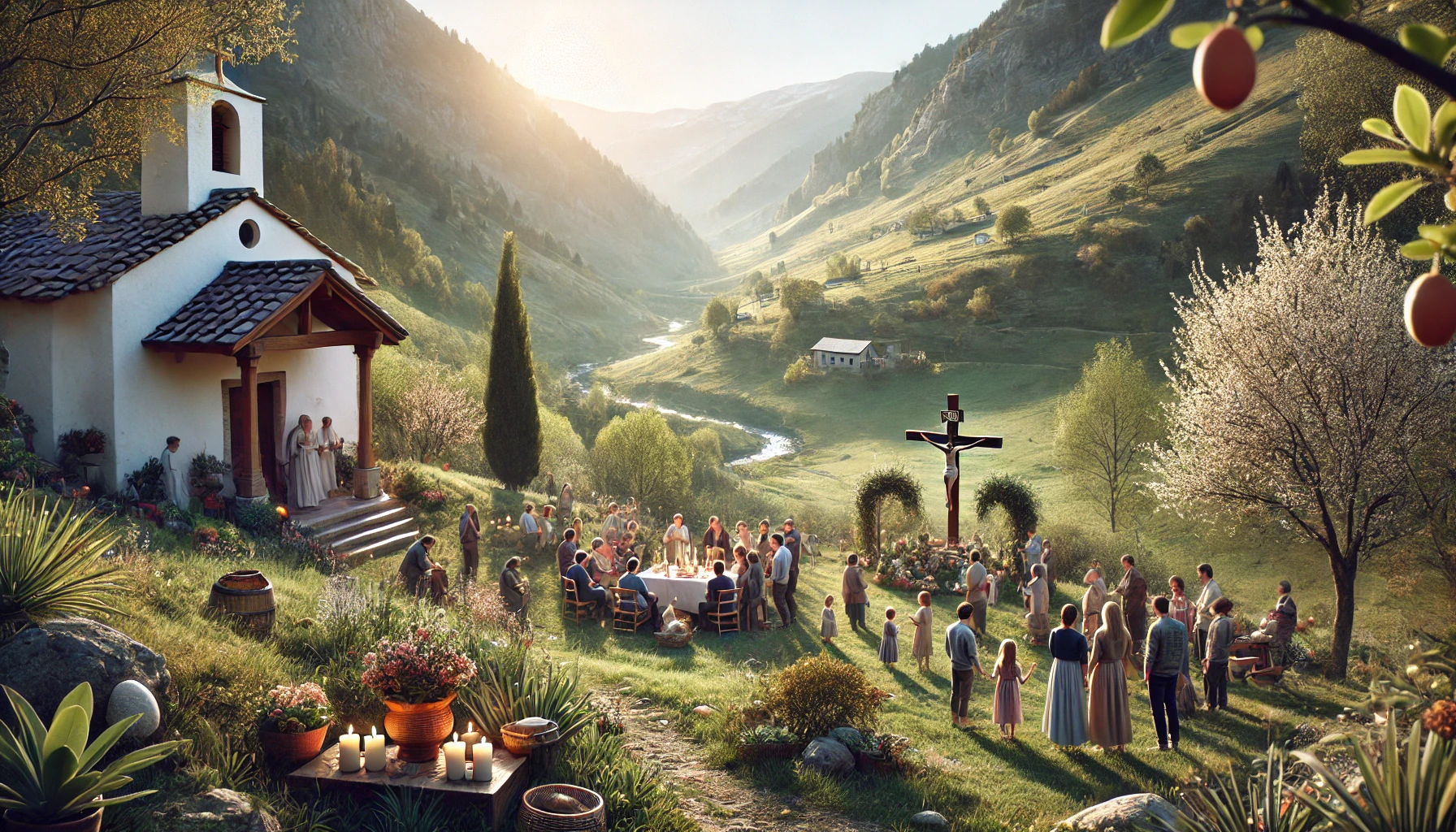
Moreover, music and dance are also integral parts of the celebrations. Local groups often perform at festivals, executing traditional songs that speak about Easter and spring. These cultural events not only provide entertainment but also reinforce Andorran cultural heritage, creating a space where everyone can come together and celebrate life. Overall, Easter traditions in Andorra stand out for their diversity and the way they unite the population in a spirit of celebration.
Typical Gastronomy of Andorran Easter Sunday
Gastronomy is an essential element of the Easter Sunday celebrations in Andorra. Families gather around the table to share traditional dishes that symbolize the season. One of the most popular dishes is "canelons," which are pasta stuffed with veal and covered with béchamel sauce. This dish, although rooted in Italian cuisine, has gained a unique version in Andorra and is often prepared during the Easter festivities.
Another highlight of Andorran cuisine during this time is "pan de Páscoa," a type of sweet bread, often flavored with dried fruits and spices. This bread is a tradition that has endured for generations and is shared among family and friends as a symbol of unity and prosperity. The preparation of this bread involves the whole family, bringing together generations in the kitchen and strengthening family bonds.

Easter sweets, such as the famous "oufs de xocolata" (chocolate eggs), are also a true passion among the Andorrans. Many local bakeries produce creatively decorated eggs, and exchanging these eggs becomes a fun part of the celebrations. The gastronomic aspect of Easter Sunday is not just a matter of satisfying the palate, but also a way to preserve the culture and traditions of the region, allowing new generations to learn about their roots.
Religious Celebrations and Community Events
On Easter Sunday, religious celebrations in Andorra are intense and full of symbolism. Masses are held in all the churches of the country, attracting worshippers who gather to celebrate the resurrection of Christ. During these ceremonies, rituals such as the blessing of food and the ceremony of the new fire are common, symbolizing the light and life that the resurrection brings. The churches are decorated with flowers and candles, creating an atmosphere of reverence and joy.
👉 Download the Calendar for 2025
In addition to the masses, community events, such as fairs and festivals, also take place in various regions. These festivities often include cultural performances, folk dances, and stalls with typical foods, where locals and visitors can enjoy local delights. This cultural exchange is vital, as it promotes social cohesion and integration among the different communities that inhabit Andorra.
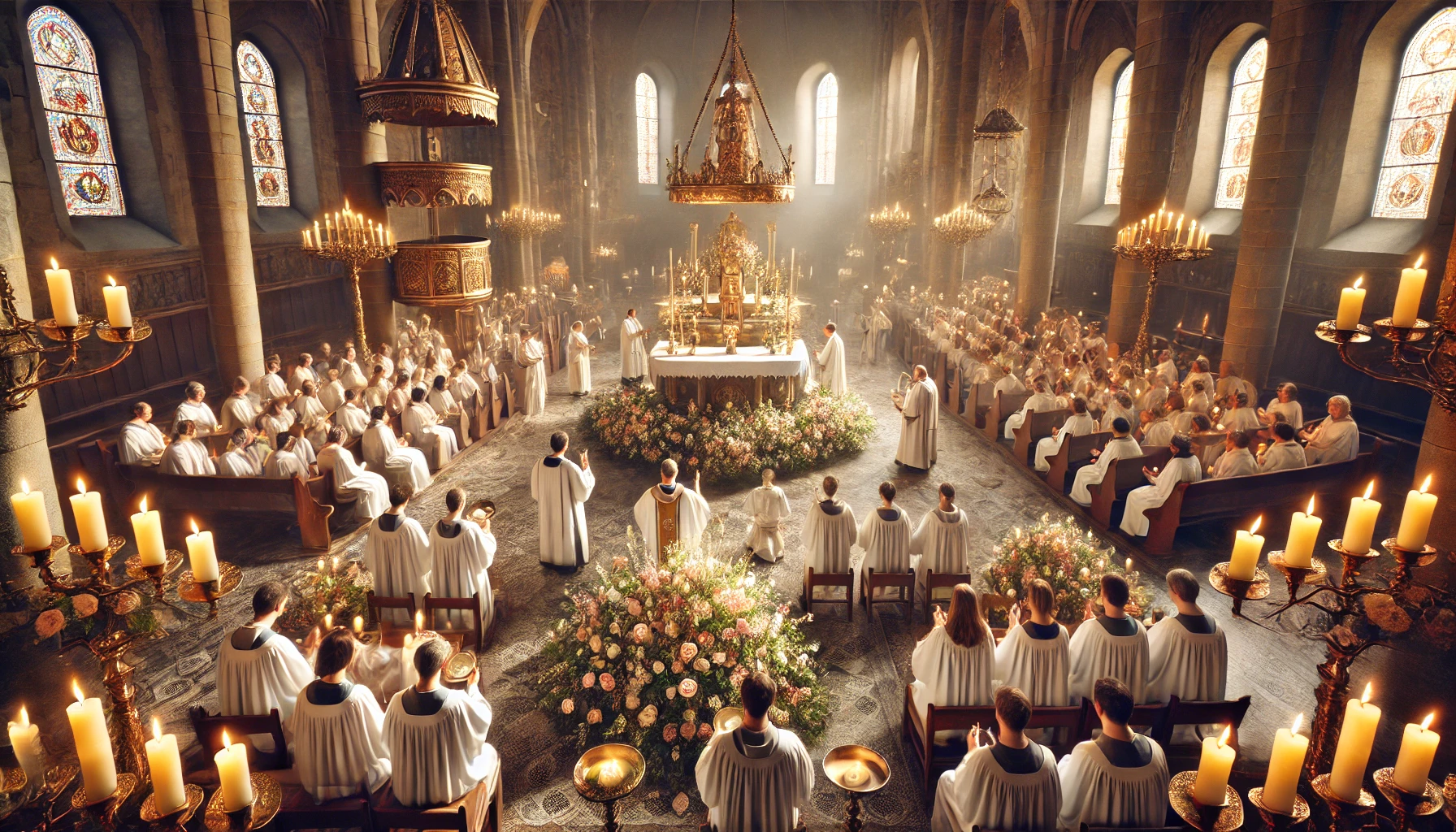
The community's participation in the celebrations is fundamental. People collaborate in organizing the events, helping to prepare the spaces and promoting the activities. This collaboration reinforces social ties and a sense of belonging, transforming Easter Sunday into a true celebration of the Andorran community. Thus, religious celebrations and community events intertwine, creating a vibrant social fabric that enriches the Easter experience.
Recreational Activities and Festivities for Children
Easter Sunday in Andorra is a highly anticipated date for children, who are encouraged to participate in various recreational activities. One of the most beloved traditions is the Easter egg hunt, where little ones search for chocolate eggs hidden in parks and gardens. This activity not only provides fun but also fosters teamwork and socializing among friends and family.
In addition to the egg hunt, many Andorran cities organize craft workshops where children can decorate their own Easter eggs with paints and stickers. This activity is an excellent opportunity for children to express their creativity and learn about Easter traditions. Parents often participate actively, making it a moment of family bonding and learning.
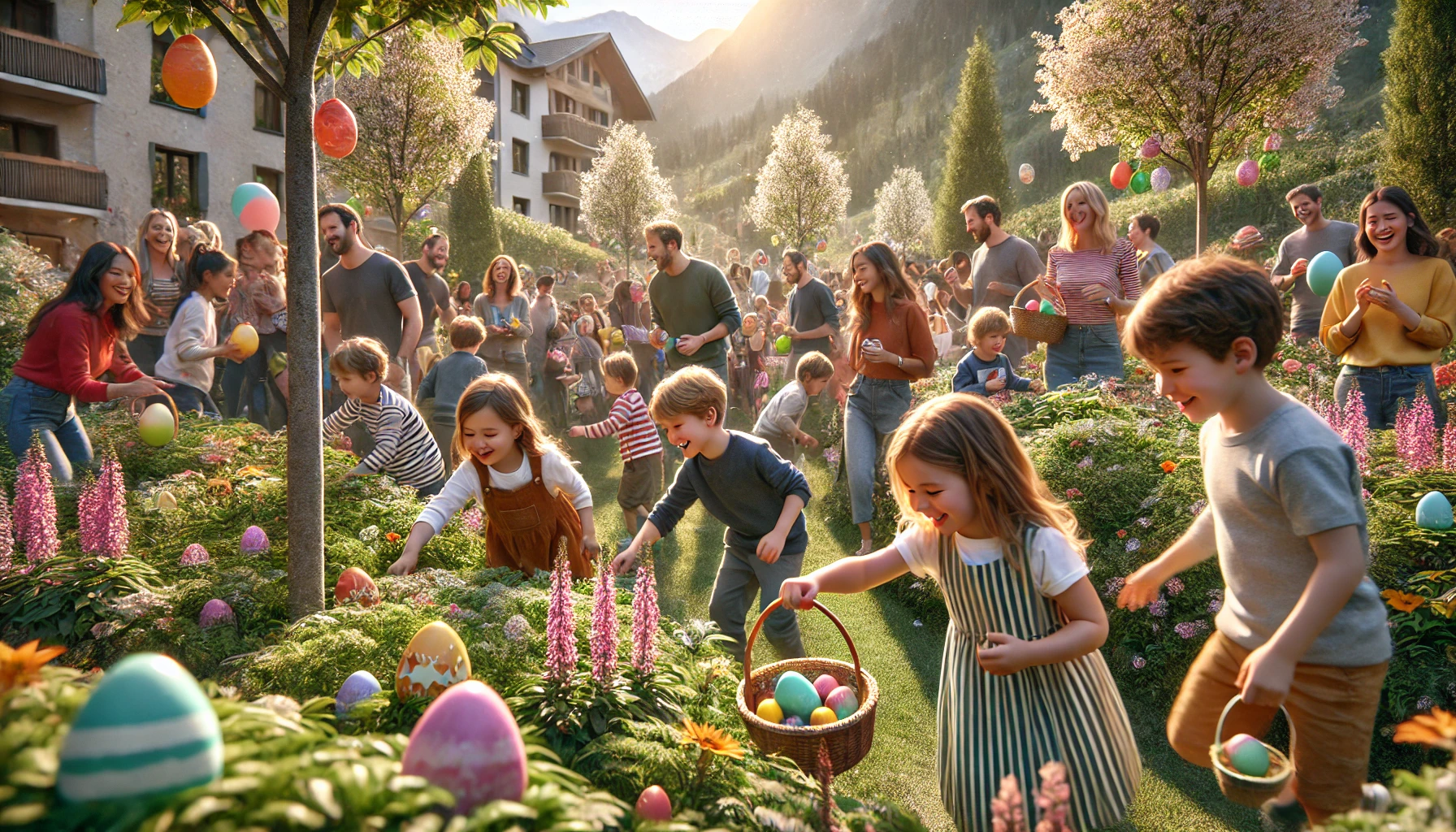
The festivities for children also include theatrical and musical performances, where local artists present pieces that address Easter themes. These performances are not only educational but also entertaining, encouraging children's participation and sparking their interest in local culture. With a variety of activities, Easter Sunday in Andorra becomes a day of joy and celebration for children, creating memories they will carry for a lifetime.
Final Reflections
The Easter Sunday in Andorra is a celebration rich in traditions, reflecting the cultural and religious diversity of the country. This special date not only marks the resurrection of Christ but also serves as a moment of unity for Andorran families, who gather around rituals and typical dishes. Thus, the importance of the event extends beyond the religious, promoting a strong sense of community.
👉 Download the Calendar for 2025
Moreover, this celebration has a significant impact on the local economy, attracting tourists who seek to experience authentic traditions and Andorran culture. The commemorative event not only values the cultural heritage but also boosts commerce and tourism, contributing to the sustainable development of the region. Therefore, Easter Sunday is an opportunity for Andorra to showcase its uniqueness to the world.
Finally, by exploring the traditions and cultural impacts associated with Easter Sunday, we can appreciate the richness of Andorran identity. This special date is not only a religious milestone but also a moment to celebrate culture and coexistence. Thus, by understanding the depth of this festivity, we reinforce the importance of preserving and valuing the traditions that shape Andorran society. The recognition of these practices is essential to ensure the continuity of the local culture.
